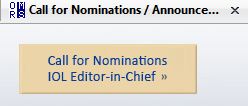I have said numerous times that the Edelman Prize presentations and papers are my favorite part of the operations research world. It is fantastic to see and read about such great work in operations research. The presentations often feature a Cxx of the firm. Watching business leaders explain the importance of operations research never gets old to me. And some of them actually read the script with feeling and (seeming) understanding (others look like they are reading under duress, with uzi’s pointed at them from just offscreen).
The Edelman’s have all been recorded through the years, and INFORMS (the professional organization that runs the Prize) has experimented with how best to distribute the results. We have gone from video tapes to DVDs to YouTube snippits. There was always an issue of monetizing the presentations. If this is our field’s best work, surely we can make money on it! But making money limits distribution.
At least for now, INFORMS seems to have given up the money aspect, and even any membership aspect, and offers the most recent Edelman presentations for the low, low cost of a site registration. Once you register, you can see all sorts of neat videos. In addition to the Edelman finalists, there are Richard O’Neill’s talk on energy markets (he is the chief economic adviser to the Federal Energy Regulatory Commission), Chris Tang’s talk on supply chain risk management, and the Wagner Prize finalists. For all, there is a proprietary presentation which shows both the powerpoint slides and the speaker.
I do have one big complaint about this setup, however. The system, as currently designed, appears to fall into a trap that operations research often sets for itself. If you know you want what the system offers, it is easy to work with: registration is fast and relatively non-intrusive. But the listing of the videos is “behind the wall”, so someone interested in, say, energy markets, has no idea that this site would have a great talk on the subject. Why aren’t all the talk titles and abstracts freely available? Better yet, why bother with registration? Based on the privacy agreement, it does not appear that INFORMS can even market to those who register. Why hide anything?
For those of us in the know, this is a tremendous resource! For those of you who have not yet discovered the beauty, fun, interest and (particularly) importance of operations research, I strongly urge you to go to the site and explore. It might change your life.
